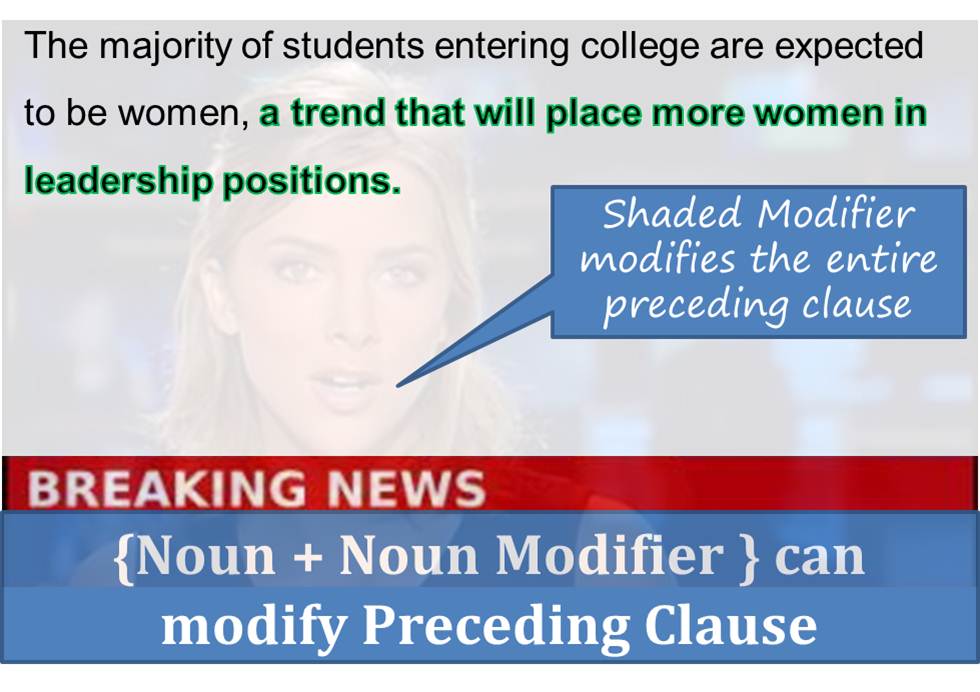
Often we see the modifiers with the following structure:
NOUN PHRASE + NOUN MODIFIER (VERB –ED OR RELATIVE CLAUSE OR VERB-ING)
For example,
- A trend that will place more women in leadership positions = Noun + Noun Modifier
- Noun = a trend
- Noun modifier = that will place more women in leadership positions.
Typically these modifiers modify the preceding nouns (grammatical term = appositives). But modifiers with this construction can also modify the preceding clause (grammatical term = absolute modifiers).
Thus, it is important to understand the scenarios in which this modification is possible. This will ensure that you do not eliminate a correct answer choice by assuming that this modifier does not make sense with the closest noun.
Let’s take two sentences and see this in action. Note that both sentences are correct and are indeed adapted from official sources as specified:
Sentence 1: This sentence is adapted from OG12#118-Choice C
The UN has declared that global warming, a phenomenon caused by human beings, will create havoc among migratory birds.
- A phenomenon caused by human beings = Noun + Noun Modifier
- Noun = a phenomenon
- Noun modifier = caused by human beings
Sentence 2: This sentence is adapted from OG12#83 – Choice B
Only two dozen products accounted for half the increase in spending on prescription drugs, a phenomenon explained by the increase in number of prescriptions written by the doctors.
- A phenomenon caused by human beings = Noun + Noun Modifier
- Noun = a phenomenon
- Noun modifier = explained by the increase in number of prescriptions written by the doctors
Lets make some observations about these sentences
- Both sentences are correct.
- Modifiers in both sentences begin with the noun – phenomenon and contain noun modifier as shown (in both modifiers the noun modifier is verb-ed modifier)
- Modifier in Sentence 1 modifies the preceding noun – global warming
- Modifier in Sentence 2 modifies the preceding clause – the fact that 2 dozen products accounted for the observed increase in spending.
If you followed the conventional rule – “noun + noun modifiers” modify closest noun – you might have rejected sentence 2. This is because it does not make sense for the modifier to modify the preceding noun. Per the sentence “half the increase in spending”, the preceding noun, is not a phenomenon. But as mentioned above, sentence 2 is correct, because such modifiers can modify preceding clause.
Take- Away Message
- Modifiers of the construction – Noun + Noun Modifier can modify either the preceding clause (grammatical term = absolute modifier) or just the closest noun phrase (grammatical term = appositive)
- The context of the sentence indicates whether such modifier modifies the noun or clause.
- Understand the meaning of the sentence to determine the modifier reference.
If you are planning to take the GMAT, we can help you with a personalized study plan and give you access to quality online content to prepare. Write to us at acethegmat@e-gmat.com. We are the most reviewed GMAT prep company on gmatclub with more than 2400 reviews and are the only prep company that has delivered more than 700+ scores than any other GMAT club partner. Why don’t you take a free trial and judge for yourself?
Where can you get more information?
Review this post to learn framework that helps you determine if such modifier modifies preceding clause. Review this post to learn the framework that helps you determine if such modifier modifies preceding noun phrase.
Register at e-GMAT to access Sentence Correction free trial.












